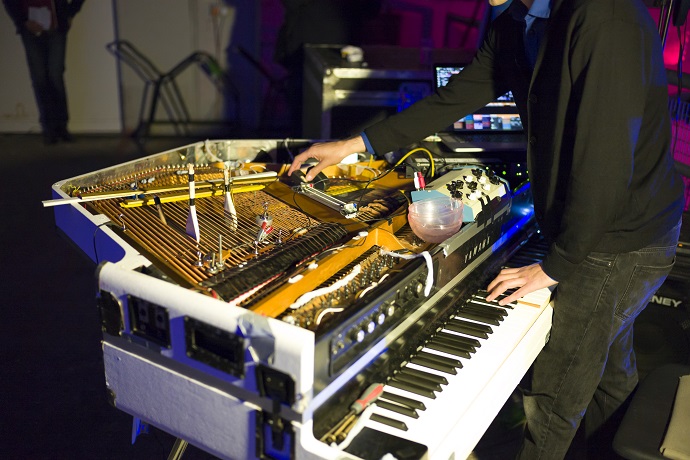
Leon Michener’s Klavikon. Photo: Nick Rutter
Ambika P3, Marylebone, London
By Richard Whitehouse
Situated within the depths of University of Westminster on Marylebone Lane, Ambika P3 is a cavernous space with no mean acoustic clarity; along with the multiplicity of vantage points, this made it ideal for Rise of the Machines – Nonclassical’s most ambitious event this season.
We heard three 25-minute parts, the first of which began with Iron Foundry – Alexander Mosolov’s solitary calling-card, whose remorseless ostinati and unrelieved dynamics came through unbounded in this reading by the Southbank Sinfonia. Then came Blue Calx, a piece by mainstay of electronica, Aphex Twin, that impresses mostly for its insinuating and ominous restraint. The finale, ‘Snow Time’, of Prokofiev’s Concerto for Turntables and Orchestra upped energy levels accordingly while providing a vivid showcase for DJ Switch.
The second part initially returned to the relative past with Leroy Anderson’s 1953 study in dexterity, The Typewriter, juxtaposed with the scherzo of Shostakovich’s Tenth Symphony, whose unbridled anguish was palpably conveyed. In between, Aphex Twin’s Cock/Ver10 (arranged by Stefan Freund) was deft and sardonic by turns, and if Larry Goves’s ‘the cloud flew round with the clouds’ seemed overly passive in this context, it concluded this section atmospherically enough.
The last brought the evening to its natural climax with the UK premiere of Gabriel Prokofiev’s Concerto for Trumpet, Percussion, Turntables and Orchestra. Its three movements may have followed an outwardly classical trajectory, but the interplay of Daniel de Gruchy Lambert’s vaunting trumpet with Joby Burgess’s explosive percussion, Mr Switch’s fluid DJ-ing and Gerry Cornelius’s purposeful direction, created its own zig-zagging momentum. It held good through to the visceral three-way work that these soloists provided as an appropriate encore.
Each of these parts was preceded by DJ-ing from Gabriel Prokofiev (the Nonclassical supremo who has taken remixing onto a new level of resourcefulness) and interspersed with two sets for Klavikon, an updated combination of prepared piano and VCS3 synthesizer, by Leon Michener. Audience response was consistently enthusiastic, and if there was a lingering sense that not a few of those present were there for the occasion rather than its content, this did little to undermine a diverse and eventful evening that presented the Nonclassical ethos in an advantageous light. ![]()